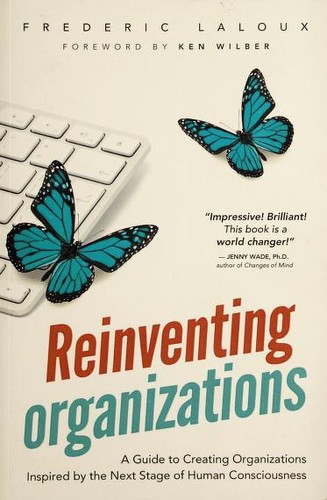Inspiring book for everyone interested in future organizations
4 estrellas
Reinventing Organizations is a clear, concise, and interesting book on organizations that I will most definitely recommend to others. As I understood it, the book comes in two editions: one regular, and one with drawings. I read the latter, and the drawings made it really easy to follow the arguments.
Another book on leadership? Books on leadership are usually inspiring. It gets you in the mood for innovation; the books are designed for you to nod along as you read. The Recipe to Success. For the book to sell, it needs an edge in the form of a newly created word. Lean, or Change Leadership, Future Leading, Agile, or similar. This book is no exception. The made-up word for the book is "Teal organizations" which obviously holds the final key to modern organizations.
My summary Reinventing Organizations argues that modern organizations would profit from giving more responsibility to …
Reinventing Organizations is a clear, concise, and interesting book on organizations that I will most definitely recommend to others. As I understood it, the book comes in two editions: one regular, and one with drawings. I read the latter, and the drawings made it really easy to follow the arguments.
Another book on leadership? Books on leadership are usually inspiring. It gets you in the mood for innovation; the books are designed for you to nod along as you read. The Recipe to Success. For the book to sell, it needs an edge in the form of a newly created word. Lean, or Change Leadership, Future Leading, Agile, or similar. This book is no exception. The made-up word for the book is "Teal organizations" which obviously holds the final key to modern organizations.
My summary Reinventing Organizations argues that modern organizations would profit from giving more responsibility to the workers and letting them work and decide in smaller teams, rather than through a hierarchy. The hierarchy, the book argues, is broken in large organizations. They create CEOs that cannot possibly handle everything alone and becomes inefficient at workflows. That is true, and I see the same in my workplace; a silly amount of formal procedures are required by my leaders, which creates more work for us. Why go the extra step when there is no way the higher level can make sound decisions on all of them?
In addition, the book argues against(!) having a clear strategy to follow, claiming it creates a lot of work, and is often outdated before it is finished - to the obvious paradox that approx 100% of businesses fail to implement the strategy in time, usually working hard to find loopholes instead (to claim it was implemented).
The idea is that organizations can evolve more organic, like a group of birds with no leaders. Let the workers decide on the budget and require only qualified advice. Let the workers hire their boss - that gives them the incentive to like their own picked boss. They use a couple of Dutch businesses as an example, and they apparently thrive with their model of having fewer leaders and letting the leaders be more of a coach.
First, this is a very easy position to take for someone that is afraid of making decisions (which many leaders suffer from). Let the workers make the decisions so I don't have to!
Second, I am not sure how this will scale.
Reinventing Education? As I work in higher education I can't help but imagine how this could transfer to student groups. With all the problems we face today with ChatGTP and platforming; how would it work if admissions, not exams, were what defined the quality?
Let us take a student doing his master's degree at our university. He gets admitted through an admission process, he gets funding, housing, courses, papers, and coaching. It would then be up to the student to write good papers and make progress. An employer will want to see the student's official transcript (of completed courses, not grades), but also his work. Ok, so he did studies in this and this, what did he really do? Having maybe a digital space for showing off the various works could be a better way of evaluating the student than a set of letters. We are not anymore in a position where people with no education hire a smart engineer to do work. That is the exception rather than the rule; with the level of education in society now, most people would be qualified to evaluate the works of others.
Institutions would then not use the big amount of resources on examination procedures that we do today, and students could spend more time studying and creating. Exams and reviews would still be an important part of the learning process of course.
This part on education was not mentioned in the book, but it was what came to my mind when reading it. Obviously, the book succeeded; I got in an innovative mood and I got some new ideas. Just as a good book on leadership should do.


